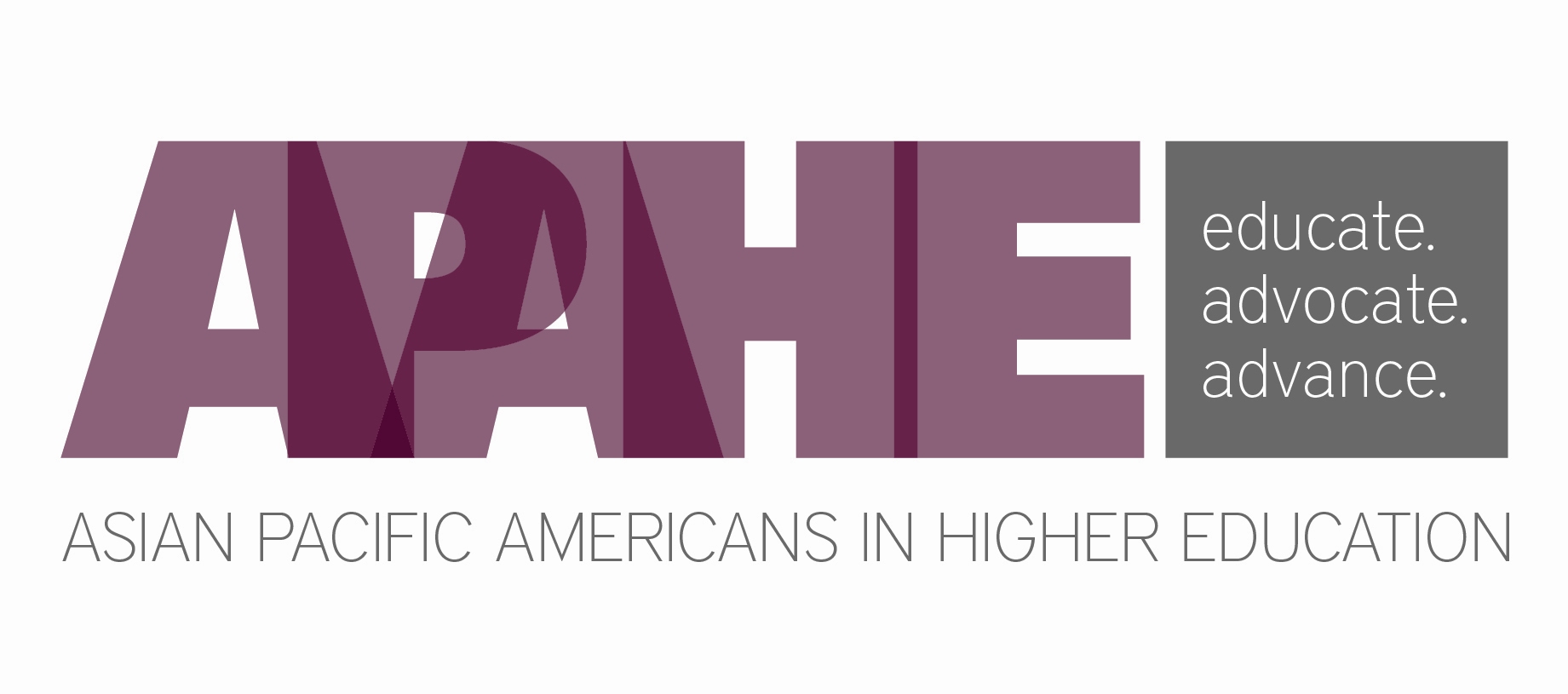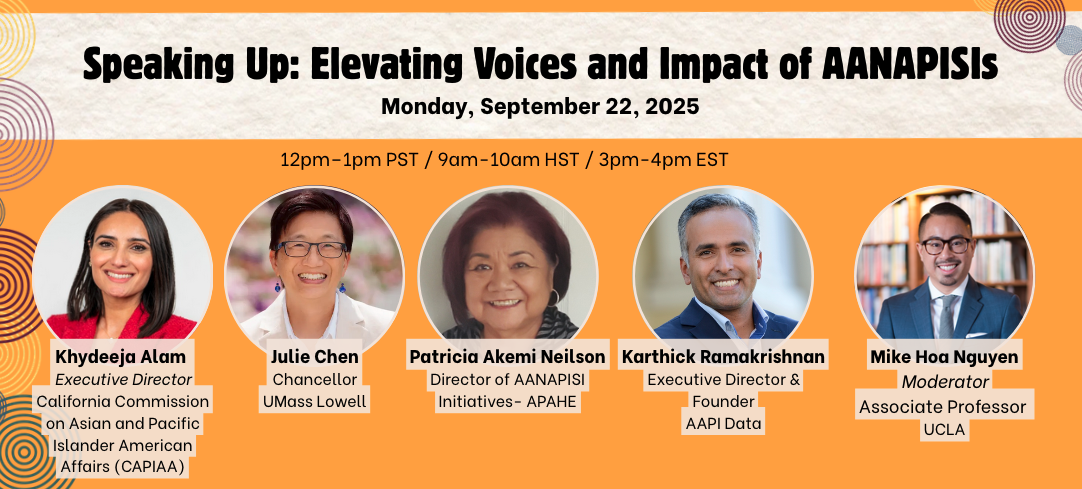When: Monday, September 22, 2025
12pm–1pm PST / 9am-10am HST / 3pm-4pm EST
Description: This panel will explore the critical role of Asian American and Native American Pacific Islander-Serving Institutions (AANAPISIs) in advancing educational equity and student success through research, practice, and policy. Featuring insights from educational researchers, practitioners, and policy advocates, the discussion will highlight how AANAPISIs elevate the voices and experiences of AANHPI students and communities.
Where: Virtual via Zoom
Registration: tinyurl.com/aanapisi25-kickoff-panel
Speakers

Khydeeja Alam is the first South Asian woman to serve as Executive Director of the California Commission on Asian and Pacific Islander American Affairs (CAPIAA). With over 18 years of experience in California public policy and public relations, Khydeeja has driven transformative change, advanced legislation, and secured billions in state budget investments. Her work has advanced equity and opportunity across the state. Before joining the Commission, Khydeeja served as Director of External and Legislative Affairs at California Volunteers, Office of the Governor, appointed by Governor Newsom. There, she led initiatives that expanded two major service programs, securing California the Innovation in Policy Making Award and increasing statewide service opportunities for thousands of youth and young adults.
Earlier, Khydeeja spent over a decade as Senior Director of Policy and Advocacy at Catalyst California, where her organizing and advocacy work drove systemic changes, improved equity in education, economic opportunities, and representation on behalf of marginalized communities, and created a new grade level in the state of California.
Named as one of the 2024-25 AAPI Change Makers of the Year by the Sacramento Bee, Khydeeja is proud to represent and serve her community. She was also recognized among the top 40 Under 40 AAPI political professionals by NAAPPPA.

Julie Chen became the fourth chancellor of UMass Lowell in 2022, making history as the university’s first Asian American, second woman, and first LGBTQ+ leader. She oversees a diverse campus of nearly 17,000 students, where she has championed access, inclusion and student success.
Under her leadership, UMass Lowell developed a new five-year strategic plan emphasizing enrollment and student success, research excellence, diversity and inclusion, and community partnerships. She also launched a guarantee that every incoming first-year student will have at least one paid, career-connected experience before graduation. Chen has advanced the vision for the Lowell Innovation Network Corridor, a 1.2 million-square- foot mixed-use development in downtown Lowell designed to co-locate industry, research, housing and community space.
A strong advocate for elevating underrepresented voices in higher education, Chen co-led the university’s Council on Social Justice and Inclusion and was co-principal investigator on a $3.5 million NSF ADVANCE grant to support women faculty in STEM. She has testified before Congress on innovation and represented the U.S. internationally in advanced manufacturing. Prior to becoming chancellor, Chen served as vice chancellor for research and economic development, strengthening industry, government and community partnerships. She received bachelor’s, master’s, and doctoral degrees in mechanical engineering from MIT.

Dr. Patricia Akemi Neilson currently serves as the Director of AANAPISI Initiatives for Asian Pacific Americans in Higher Education (APAHE), a national organization. She has extensive experience serving as an independent external evaluator grant implementation consultant/coach for MSI grant projects, primarily for AANAPISI grants including funded grants in California, Washington State, Virginia, Oregon, and Massachusetts since 2018. Dr. Neilson has consulted with AANAPISI eligible institutions with the development of their grant proposal. She has served as the Founding Director of three AANAPISI Part A and F grants and been responsible for projects totaling over $5.15 million to narrow the achievement gap for targeted low-income, underserved populations.
Dr. Neilson provides AANAPISI leadership in higher education partnerships, including the White House initiative on AAPI Affairs, the US Department of Education, the AANAPISI consultant to Asian Pacific Islander American Scholars (APIA Scholars), and for ten years has facilitated the APAHE/AANAPISI Pre-Conference Institute, an annual convening of AANAPISI stakeholders. She is an emeritus member of the Asian Pacific Americans in Higher Education (APAHE) Board of Directors.
Prior to her consulting focus, in addition to being the Founding Director of the AANAPISI grants at the University of Massachusetts Boston, she was the Director of the Center for Collaborative Leadership for six years, an executive leadership development program to develop a new generation of leaders for the Boston region, housed in the College of Management. Prior to her 15-year tenure at UMB, she served at North Shore Community College for 18 years, concluding her service at that institution as an Academic Dean.
Dr. Neilson has a Ed.D in Leadership in Education, University of Massachusetts Boston, Master’s in Public Health, University of Hawaii Manoa, and a Bachelor’s of Science in Psychology, Seattle University. She has a Connective Leadership Institute (executive coaching) certification and a Certificate of completion from Harvard University in the Art and Practice of Leadership

Karthick Ramakrishnan has served in leadership roles that span academia, government, public policy, and philanthropy. He is currently a resercher at the University of California, Berkeley and director of AAPI Data, a nationally recognized publisher of demographic data and policy research on Asian Americans and Pacific Islanders. He is also Strategy Lead for the Americas at School of International Futures, and Senior Advisor at States for the Future.
Ramakrishnan previously served as Executive Director of California 100, a transformative statewide initiative focused on California’s next century, and as president of the Association of Princeton Graduate Alumni. He also served for 4 years as associate dean of UC Riverside’s School of Public Policy and for 19 years as a professor. He has published many articles and 7 books, including most recently, Citizenship Reimagined (Cambridge, 2020) and Framing Immigrants (Russell Sage, 2016), has written dozens of opeds and has appeared in nearly 3,000 news stories.
Ramakrishnan was named to the Frederick Douglass 200 and is currently working on projects related to racial equity in philanthropy and regional development. He holds a BA in international relations from Brown University and a PhD in politics from Princeton.

Mike Hoa Nguyen, PhD (he/him) is associate professor of education in the School of Education and Information Studies. His research and teaching critically examine the benefits and consequences of racialized public policy instruments in expanding and/or constraining educational systems, with a specific focus on how these dynamics shape access, learning, opportunity, and success within and beyond schools for students of color.
Dr. Nguyen aims to better articulate how race-conscious federal policy can reach its potential, and fulfill its promise to address pervasive educational inequalities for underserved and underrepresented populations and regions within the United States. He is the principal investigator of The Minority-Serving Institutions (MSI) Data Project, a research and resource initiative with the mission to advance a greater understanding of MSIs and their unique contributions to postsecondary education. An extension of this work explores Asian American & Native American Pacific Islander-Serving Institutions (AANAPISI) and their role in building capacity to serve Asian American, Native Hawaiian, and Pacific Islander (AA and NHPI) students, staff, faculty, and administrators.
In addition to his academic work, Dr. Nguyen has extensive professional experience in federal government, having served as a senior staff member in the United States Congress. He is deeply committed to applying his research to inform and advance public policy and institutional practice. During the Biden-Harris Administration, he was appointed to the first-ever Historically Black Colleges and Universities and Minority-Serving Institutions Federal Advisory Council at the U.S. Environmental Protection Agency. He was also appointed by the Governor of Colorado to the History, Culture, Social Contributions, and Civil Government in Education Commission.
Dr. Nguyen currently serves on the Board of Directors for Asian Pacific Americans in Higher Education (APAHE) and Southeast Asia Resource Action Center (SEARAC). He continues to volunteer and provide research consulting for education and civil rights organizations. Most recently, he co-authored amicus curiae briefs on behalf of social scientists in SFFA v. Harvard, which was discussed during oral arguments at the U.S. Supreme Court and cited by the U.S. Court of Appeals for the First Circuit in their opinion to uphold affirmative action. He is the proud son of Vietnamese American refugees.

